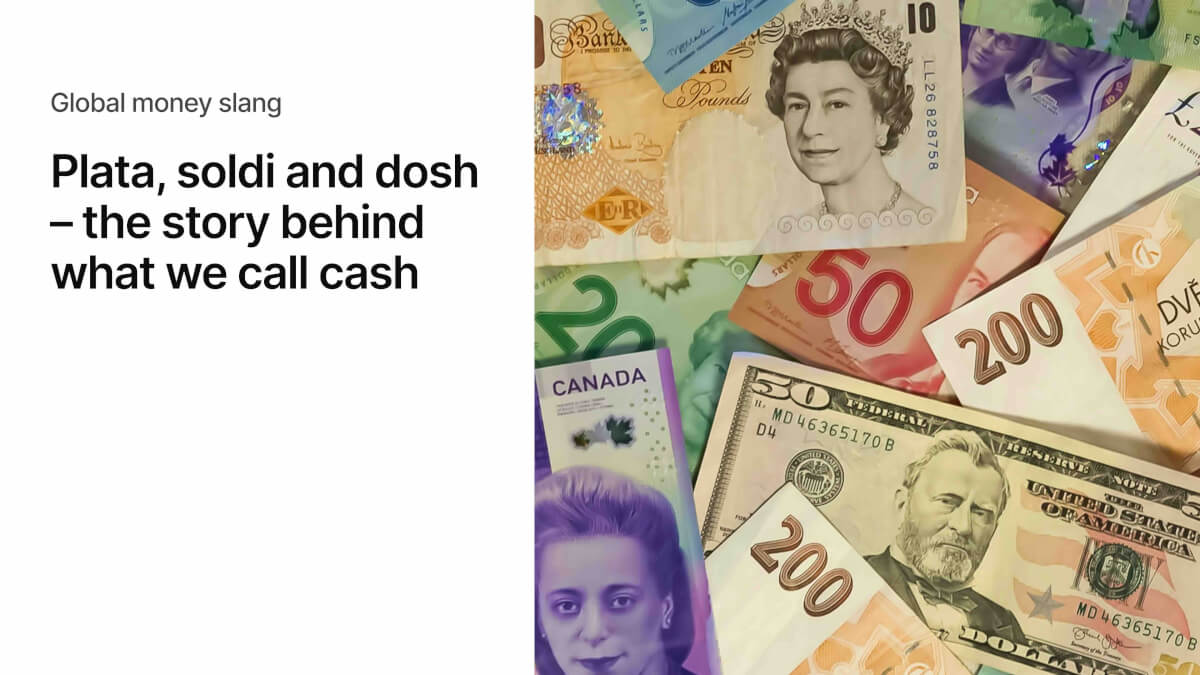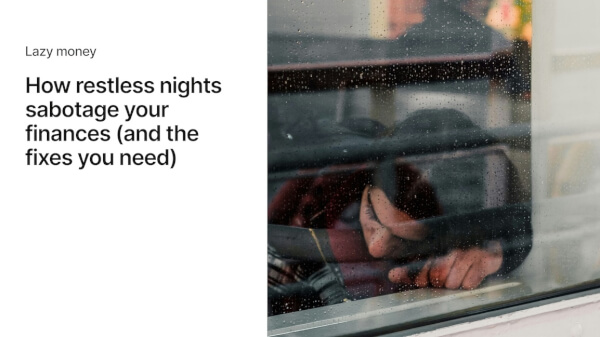Your Christmas Dinner in numbers
Tis the season to eat a lot of yummy food, so Wise has teamed up with the food-and-culture expert and Chef, Mallika Basu as part of our Christmas Without...

Ever wondered how money slang was coined? (We’re not sorry about using that pun.) So did we, which is why we’ve popped on our spectacles, stretched our fingers out and gone to town on Google Search.
Just because the chances of us having actual physical money at hand are lower than in the past doesn’t mean you can’t flex your slang skills like the citizen of the world you are. We'll be answering big questions like “why are dollars called bucks?”, “what British money slang can I use to make it look like I’m in a Guy Ritchie film?” and “why on earth am I reading this article?”
It’s going to be great.
Before we get into it, let’s take it from the top with a pretty well known expression so you know what you’re getting into here.
Ever stopped for a second to think about the sound and meaning of a word that once seemed so normal to you? Suddenly it doesn’t roll off the tongue the same way and you’re left wondering why on earth we say it at all. That’s where “bucks” comes in.
The term “bucks” has been flung around for ages. In case you didn’t know, it’s used when referring to $1. It’s thought that the origin of the American term dates back to the colonial period where buckskins were used for trade. Now how about that for a history lesson? (it’s all downhill from here, we promise.)
The Americans also brought us joyous terms such as…
Benjamins
A Benjamin or a Benny is a $100 bill thanks to Benjamin Franklin’s face being on the note.
A grand
We use this in the UK too but it was brought to us by our American counterparts. Dating back to the early 1900’s it’s used to reference the saying “a grand sum of money.” Later down the line it became associated with “the G note” which is, of course, $1000.
If you’re in the States you can also use cash chat such as “cheddar”, “dough” and “bones” and you’ll be 100% accurate, but you’ll also be 100% laughed at by the cashier.
Like our friends across the pond, slang for money in England is pretty widely used, so the only thing that may surprise you here is the backstory to these linguistic lovelies.
Pounds
Not exactly slang, but as we were looking into this article we thought “hang on, what’s this all about?” Well, as it happens, the British currency name stems from the Latin word poundus which means “weight.” How classy.
A quid
A true classic. If you’re in the UK and someone asks you if you have a quid on you, don’t panic. It may sound like a made up word from JK Rowling’s wizarding realm but it actually means £1. Once again the Brits are bringing their Latin A-game. This term is thought to come from the term quid pro quo which means “something for something.” Latin, logical, love it.
Dosh
This word just means money generally, and it was most frequently used in the 1950s. Sure, it’s still slipped into conversation from time to time, but if you aren’t a cockney local you’ll sound like Dick van Dyke trying to be British in Mary Poppins. There’s discussion as to where this term originates from but many think it refers to the word “doss” which means a place to sleep at night. Essentially, having to pay for a bed for the evening.
A monkey
You wouldn’t go into a Pret A Manger in the UK and be asked to pay a monkey for your almond croissant and Flat White, but this is a fun one to know regardless. This one dates back to when British soldiers were returning to the UK from India. Why? Well, the Indian 500 Rupee note at the time had a monkey on it.
Lady Godiva
We have to finish on a high. The cockneys have given us some wonderful things; pie and mash, Danny Dyer and, of course, cockney rhyming slang. Rhyming slang is an art form in which you replace words with phrases or terms that rhyme. So, for instance, “Army and navy” well you're having gravy. “Apples and pears” guess what? It’s stairs. You get the gist. So naturally it only makes sense that a “Lady Godiva” is a fiver (for our international buddies out there, that’s £5).
There are a multitude of Spanish speaking countries across the globe but we’ve focused on good old España for this one. The Spanish have a lot, and we mean, a lot of slang words for money. Here’s a handful to get you started.
Plata
Like the British use of “Dosh”, Plata just refers to money generally. The word literally means silver. Makes sense.
Dinero
Also referencing money and not a particular coin or note, Dinero dates back to the 10th century where it was the currency of the Spanish Christian states at the time. The name was taken from the French “denier” currency.
Billete
Back at it again with the practically, “Billete” translates to bill. Billete is traditionally used when referring to larger sums of money.
Verdes
Verdes means green. If this needs further explanation, well, we’re sorry.
The more we look into this topic, the more we realise how rogue we went with our money slang in the UK and USA But, here we are.
Soldi
Italians use the term Soldi, which is the plural of “Soldo”, the name of the mediaeval silver coin used in the country at the time. The coin was brought into circulation by Emperor Enrico VI during the 12th century.
Piotta, testone and sacchi
If you’re going to live your Roman Holiday dream like Audrey Hepburn then these three words may help you look like a local. Use “Piotta” for €100, “testone” for €1000 and “sacchi” for euros in general.
If there’s anything we’ve learnt from Emily in Paris it’s that to the English-speaking ear, everything sounds pretty in French. So it’s no wonder that the French words for money are way more poetic sounding than “A Monkey.” Sorry, England.
Pognon
We couldn’t find the exact origin of Pognon, but what we did discover is that it’s the French version for “dough” or “dosh.” Edgy.
Thune
Good luck pronouncing this one. Thune comes from the 19th century and referred to a five franc coin. They also used the term “un sou” for a silver or gold coin so nowadays, you can use both of these phrases when talking cash money.
Blé
Blé literally means wheat, so we can go ahead and assume that this routes back to the good old days of trade.
It would be an injustice to finish off this article without introducing you to a few gems we found along the way. So without further ado, here are some of our favourites:
Boodle
Apparently this is used in the UK and USA. Have we heard it before? No. Do we absolutely want to make this a thing? Yes. It comes from the Dutch word “Boedel” which means property and “Boodle” was typically used in the past when discussing criminally acquired cash. Naughty, naughty.
Spondoolicks
Not even Roald Dahl could come up with a word as beautiful as Spondoolicks. 19th century Americans loved this turn of phrase. It comes from the Greek word “Spondulys” which means “Shell.” What does a shell have to do with money you ask? It was used as currency for trade in the past.
Wonga
Ah, Wonga. What a word. Believe it or not, this little wonder is Romany for “coal”, which was slang for money in the 18th to 19th century. How did it make its way over to the UK? No idea, but we’re glad it did.
| 💸 If you want to send Wonga from A to B then check out our website for fair, affordable, real-time exchange rates. |
|---|
*Please see terms of use and product availability for your region or visit Wise fees and pricing for the most up to date pricing and fee information.
This publication is provided for general information purposes and does not constitute legal, tax or other professional advice from Wise Payments Limited or its subsidiaries and its affiliates, and it is not intended as a substitute for obtaining advice from a financial advisor or any other professional.
We make no representations, warranties or guarantees, whether expressed or implied, that the content in the publication is accurate, complete or up to date.

Tis the season to eat a lot of yummy food, so Wise has teamed up with the food-and-culture expert and Chef, Mallika Basu as part of our Christmas Without...

Millions of people around the world travel over Christmas, Hanukkah and Kwanzaa. In 2022 alone, 77,000 flights took off on Christmas Day globally. That may...

Salt-N-Pepa the iconic hip hop group = ❤️ love Salt and pepper, AKA the only seasoning I used as a university student = 🥲sigh Taking the Spice Girls advice...

The festive season is upon us, and it’s pretty much the same deal every year: Shop for gifts last minute Eat like a Sumo wrestler in training Travel to see...

We've teamed up with personal finance expert, Kia Commodore to help give your money a kick up the backside so you can go ahead and sleep. “Lazy Money” is what...

We've teamed up with personal finance expert, Kia Commodore to help give your money a kick up the backside so you can go ahead and sleep. “Lazy Money”...